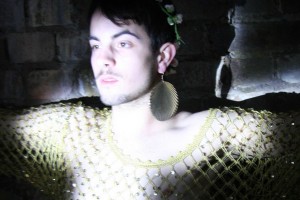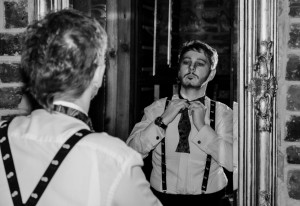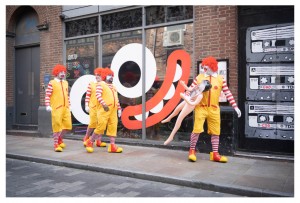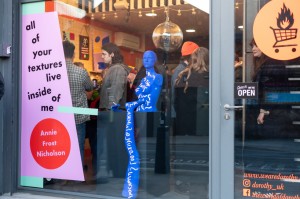Of Saints and Go-Go Boys — Reviewed
C James Fagan steels himself for an ‘erotically charged’ evening of ‘the abject, the shocking, and the profane’…
Somewhere tonight three people are setting out on a destructive path. Caught in a hermetic world, they have nothing but each other and an obsession with martyrdom. The Trinity, made up from Divine, Darling and Our Lady, is a family brought together by a desire to belong, even if that means their own self-destruction. It’s the top of a downward spiral, and as the Americans say, the only way out is through.
This is Of Saints and Go-Go Boys, the latest performance by Joseph Mercier and his company of collaborators PanicLab, staged at the Unity Theatre for a co-commission with Homotopia Festival. The show is inspired by Jean Genet’s free-flowing and poetic debut novel Our Lady of The Flowers (1943), an account of the Parisian underworld through the eyes of drag queens, murderers and pimps.
Mercier has been described as ”a choreographic provocateur” (Luc Jennings, The Observer), and his actions straddle dance, live art and contemporary theatre. There are warnings screaming ‘very explicit sexual content’, and I really don’t know what to expect.
It’s a claustrophobic space that I enter; the cloying sweet smell of perfume making the air feel dense. Stage 2 at the Unity has been transformed into specific zones: Divine’s bedroom; Darling occupying a living room complete with sofa, TV and petal strewn floor; a shower room where Divine delivers monologues; and finally a strange territory which Our Lady inhabits. Through the night this space is used as a womb, a place to snort glitter, and as a pedestal.
Walking between these tableaus in a world of neon crosses and cheap iconography, I become acutely aware that I’m a voyeur. Admittedly an invited voyeur, into a world where your real name is unimportant. This voyeuristic element is provided by the removal of the traditional setting of stage and seating, and thus the normal audience/performer relationship.

Is this to make me as the viewer and us as audience complicit in what unfolds out before us? We can’t simply fall into a passive state and let the narrative wash over us. Neither can we interfere with the narrative; like the trio of characters we too are locked in a set course. The only freedom we have is which angle to view it from.
Of course that leads to difficulties; there’s always the sensation that you’re missing out, that some important piece of information is slipping by the corner of your eye. There’s also the issue of other people floating around reminding you that you’re one of many voyeurs and indeed you may be watched yourself. Like some impassive choir of angels, we watch the characters move from tenderness to violence as the tale of Our Lady progresses.
What is happening? Well it appears to be the sublimation of the character Our Lady and his pain-filled assent into sainthood, guided by (or should that be controlled by) Divine and Darling. They are using Our Lady as their own way to glorification through the process of death and rebirth.
In this heady mix of violence, sex and religious iconography, I begin to see a connection with the worlds of novelist and spoken word performer William S Burroughs; it’s like a vignette from his short story collection, Interzone (1989). Where the little death of orgasm leads to liberation, to form a new enlightenment.
It wasn’t surprising to find out that Of Saints and Go-go Boys’ source material, Our Lady of The Flowers, was a huge influence on Burroughs and the rest of the Beat writers.
It also goes some way in explaining the narrative style. By presenting the performance in a ‘promenade’ format, you gain the sense of a free-flowing narrative which draws us into this distorted nihilistic view of the world at large. This world created by The Trinity has its own dirty seductive glamour, and it is a glamour; an illusion, a delusion in fact, brought on by the fantasies of sainthood of Divine.
As Our Lady, Divine and Darling leave the space one by one, they leave nothing behind, but I suspected that this tale would not have a happy ending.
C James Fagan
Read further Homotopia coverage: A Voice Heard By All: Dickie Beau, Lost in Trans
More on Joseph Mercier and PanicLab here
The main Homotopia Festival continues until end November 2013; see full programme here





